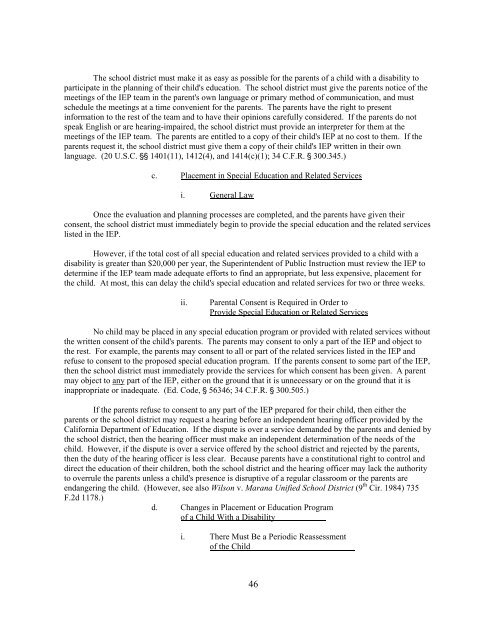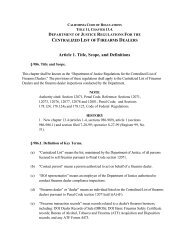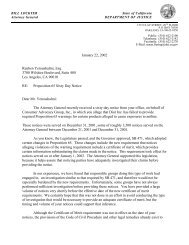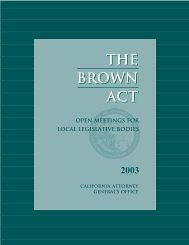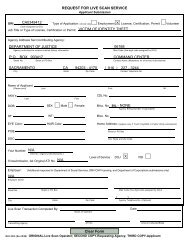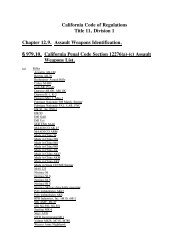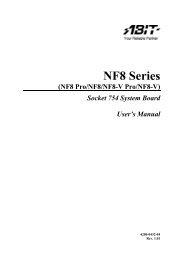Legal Rights of Persons With Disabilities - Ossh.com
Legal Rights of Persons With Disabilities - Ossh.com
Legal Rights of Persons With Disabilities - Ossh.com
You also want an ePaper? Increase the reach of your titles
YUMPU automatically turns print PDFs into web optimized ePapers that Google loves.
The school district must make it as easy as possible for the parents <strong>of</strong> a child with a disability to<br />
participate in the planning <strong>of</strong> their child's education. The school district must give the parents notice <strong>of</strong> the<br />
meetings <strong>of</strong> the IEP team in the parent's own language or primary method <strong>of</strong> <strong>com</strong>munication, and must<br />
schedule the meetings at a time convenient for the parents. The parents have the right to present<br />
information to the rest <strong>of</strong> the team and to have their opinions carefully considered. If the parents do not<br />
speak English or are hearing-impaired, the school district must provide an interpreter for them at the<br />
meetings <strong>of</strong> the IEP team. The parents are entitled to a copy <strong>of</strong> their child's IEP at no cost to them. If the<br />
parents request it, the school district must give them a copy <strong>of</strong> their child's IEP written in their own<br />
language. (20 U.S.C. '' 1401(11), 1412(4), and 1414(c)(1); 34 C.F.R. ' 300.345.)<br />
c. Placement in Special Education and Related Services<br />
i. General Law<br />
Once the evaluation and planning processes are <strong>com</strong>pleted, and the parents have given their<br />
consent, the school district must immediately begin to provide the special education and the related services<br />
listed in the IEP.<br />
However, if the total cost <strong>of</strong> all special education and related services provided to a child with a<br />
disability is greater than $20,000 per year, the Superintendent <strong>of</strong> Public Instruction must review the IEP to<br />
determine if the IEP team made adequate efforts to find an appropriate, but less expensive, placement for<br />
the child. At most, this can delay the child's special education and related services for two or three weeks.<br />
ii.<br />
Parental Consent is Required in Order to<br />
Provide Special Education or Related Services<br />
No child may be placed in any special education program or provided with related services without<br />
the written consent <strong>of</strong> the child's parents. The parents may consent to only a part <strong>of</strong> the IEP and object to<br />
the rest. For example, the parents may consent to all or part <strong>of</strong> the related services listed in the IEP and<br />
refuse to consent to the proposed special education program. If the parents consent to some part <strong>of</strong> the IEP,<br />
then the school district must immediately provide the services for which consent has been given. A parent<br />
may object to any part <strong>of</strong> the IEP, either on the ground that it is unnecessary or on the ground that it is<br />
inappropriate or inadequate. (Ed. Code, ' 56346; 34 C.F.R. ' 300.505.)<br />
If the parents refuse to consent to any part <strong>of</strong> the IEP prepared for their child, then either the<br />
parents or the school district may request a hearing before an independent hearing <strong>of</strong>ficer provided by the<br />
California Department <strong>of</strong> Education. If the dispute is over a service demanded by the parents and denied by<br />
the school district, then the hearing <strong>of</strong>ficer must make an independent determination <strong>of</strong> the needs <strong>of</strong> the<br />
child. However, if the dispute is over a service <strong>of</strong>fered by the school district and rejected by the parents,<br />
then the duty <strong>of</strong> the hearing <strong>of</strong>ficer is less clear. Because parents have a constitutional right to control and<br />
direct the education <strong>of</strong> their children, both the school district and the hearing <strong>of</strong>ficer may lack the authority<br />
to overrule the parents unless a child's presence is disruptive <strong>of</strong> a regular classroom or the parents are<br />
endangering the child. (However, see also Wilson v. Marana Unified School District (9 th Cir. 1984) 735<br />
F.2d 1178.)<br />
d. Changes in Placement or Education Program<br />
<strong>of</strong> a Child <strong>With</strong> a Disability<br />
i. There Must Be a Periodic Reassessment<br />
<strong>of</strong> the Child<br />
46


